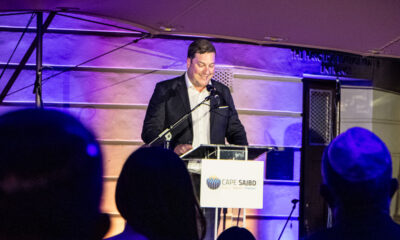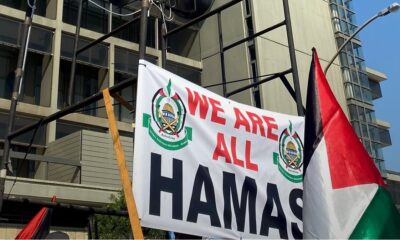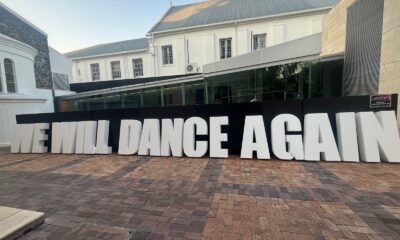
Community

Women bring peace to violent Cape gangland
Debby Silver and Kashiefa Mohammed may come from different religious, social, and economic backgrounds and live in different parts of Cape Town, but when they work together to empower women, those differences fall away.
Silver, fellow social worker Glenda Mark, and Mohammed have set up support groups for mothers who live in the Cape’s notorious ganglands and have lost children to gang violence.
Silver and Mark do this work as volunteers under the banner of the Union of Jewish Women (UJW). Mohammed met them after her son was killed. Because of the support she received from them, Mohammed was inspired to start her own organisation, Cycle of a Woman, in her neighbourhood of Hanover Park. Silver and Mark came on board to offer counselling and support groups for grieving mothers. In turn, they have trained these women in basic counselling skills so that they can help their communities.
Speaking to the SA Jewish Report the day before her 70th birthday, Silver says she prefers to stay out of the limelight and avoids accolades, but admits she has been “working in these trenches for 30 years. It’s my passion.”
She has always worked in the broader community, beginning by supporting political prisoners in Johannesburg during apartheid. After she moved to Cape Town, she teamed up with Joan Rubinstein, who was working at Lifeline at the time. They pair felt a need to further women’s empowerment, and joined the UJW, which they believed would help them achieve these aims.
They opened a women’s empowerment centre which dealt with all aspects of women’s lives. They also offered support groups and courses for the Jewish community. At the time, the HIV/AIDs pandemic was ravaging the country, and they worked with desperately ill babies and their families.
They were then approached to work with women in Cape Town’s infamous Pollsmoor Prison. “For eight years, we ran support groups for female prisoners. We loved it, and were loved. They would announce each session by saying, ‘The Jewish are here,’” she smiles. “It ended only because of bureaucracy.”
All of this work was voluntary, but Silver found it energising and uplifting alongside her work in private practice. “After a period of time, Joan emigrated, and soon after, Glenda and I were approached by Kashiefa. We liked the idea of empowerment work, based on the #MeToo movement, creating a space for people to tell stories.”
But pretty soon they became aware that there was a need for a bereavement group. “Out of the 10 women we met, eight had lost kids to gang violence. In the very first group, we met in the library, and one woman was crying. When we asked her why, another woman asked, ‘Can’t you hear?’”
She was referring to the gunshots that they could hear ricocheting past as they were conducting the group. “It was bringing up memories for the mother, whose child had been killed only the week before. We realised there was work to do.”
In addition to bereavement counselling, Silver and Mark wrote a programme called “Who Am I”.
“It’s about women discovering who they are and how to grow stronger through their hardship,” Silver says.
They realised that training the women as volunteer counsellors could help expand their impact. Silver and Mark have since conducted similar workshops and training in the nearby township of Gugulethu. “It’s rewarding to train and pass skills on,” says Silver.
The bereaved women also support one another when they go to court or deal with the police, and they try to ensure that children are safe when bullets are flying in the streets.
Silver and Mark also bus the women to their UJW premises in Sea Point, which is a literal breath of fresh air. “They say they love coming there because they get to hear birds singing. Because of all the shooting, there are no birds singing in Hanover Park.” She says that if people want to assist the project, funding transport would be a huge help.
Silver has heard horrendous stories, such as one mother who lost not one but two children to gang violence. Along with the loss, most of the women have endured abuse or seen other women and children being beaten, raped, and killed.
Silver says that some women have lost children who joined gangs and then were killed in gang warfare, while others had children killed by stray bullets. “It doesn’t make a difference – loss is loss,” she says. Most women don’t receive closure or justice. Even if a killer is convicted, he’s often released early and returns to the community, reopening old wounds.
She says the communities have been very receptive to them, and for the women themselves, who don’t have the luxury of attending therapy, “it’s been a dream come true”.
The fact that Silver and Mark are Jewish and most of the bereaved women are Muslim isn’t an issue. “We’re all women, and we all want the same thing – to feel safe, for our kids to be safe, and for our voices to be heard,” says Silver. At the same time, she contemplates that she has, perhaps, created an interfaith forum without naming it or forcing it, creating genuine connections that might never have been forged.
She’s inspired by the women she works with – from those in the group, to Mark and Mohammed. “These are salt-of-the-earth women who are just trying to raise their families and live their lives. We are all so similar. If we can make things just a little easier, then we’ve made a difference.”
Her Jewish values are at the root of all she does. “My father was accepting of all people. Both my parents emphasised the importance of our responsibility to our fellow man and woman. It was deeply instilled, and I’m grateful for that.”
Though she says the work is “taxing”, and requires a specific set of skills, she encourages others to get involved in the UJW’s many projects.
To anyone who feels overwhelmed at the thought of trying to make a difference, she suggests they “start by helping just one person. People who do this know the reward. It has enriched my life.”











Pam
November 17, 2022 at 10:17 am
Amazing. What incredible women.